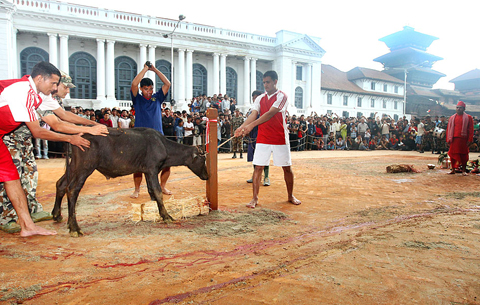Every five years a temple in southern Nepal plays host to an extraordinary religious festival in which hundreds of thousands of animals are sacrificed to the Hindu goddess of power, Gadhimai.
For two days, the tiny village of Bariyapur near Nepal’s border with India flows with blood as thousands of Hindu devotees flock to the temple to take part in what organizers believe is the world’s biggest ritual slaughter.
Many travel from India for the festival, which has been running uninterrupted for around three centuries and next takes place on Nov. 24 and Nov. 25.

PHOTO: AFP
But this year, a group of animal rights activists is campaigning to stop what it says is senseless cruelty to innocent creatures — pitting themselves against Hindu devotees in this deeply religious nation.
“We launched our campaign to put a stop to the gruesome killing of animals in the name of God,” said Pramada Shah, director of campaign group Animal Nepal, which launched an online petition demanding the festival be canceled.
“Even in the 21st century, innocent animals are facing cruel treatment due to people’s superstition,” Shah said.
The campaign received a boost when it won the support of Ram Bahadur Bomjam, a young Nepalese man believed by followers to be a reincarnation of Buddha after supporters said he could survive without water, food or sleep.
Bomjam, dubbed “Buddha Boy” by Nepalese media, has spent the past year meditating in the jungle near Bariyapur, but last week broke his silence to condemn the festival.
“Human beings have turned brutal by offering animal sacrifices to the goddess. This practice must be stopped now,” media quoted him as saying.
Bomjam’s supporters have organized their own campaign to put a stop to the festival, distributing pamphlets in the area and in Indian towns on the border urging people not to take part.
One reason for the event’s huge popularity is its proximity to India, where some states have banned sacrificial slaughter.
“In India today there is greater awareness about animal sacrifice and suffering, so people and rights activists are against it,” said N.G. Jayasimha, campaign manager for People for the Ethical Treatment of Animals in India.
“Some states have banned animal slaughter even for religious purposes — including Karnataka, Gujarat and Madhya Pradesh. So all these factors contribute to the numbers going to Nepal,” Jayasimha said.
But animal rights campaigners face an uphill struggle in Nepal, where Hindus make up 80 percent of the population and ritual sacrifice is a part of everyday life.
Local authorities said they would increase security surrounding the festival, which begins with the sacrifice of two wild rats, a rooster, a pig, a goat and a lamb before the temple’s statue of Gadhimai.
Devotees can then bring their animals into the temple for ritual purification before taking them into the grounds where they will have their throats slit. The meat is distributed and eaten.
Nepal’s government has already pledged 4.5 million rupees (US$60,000) in funding for the festival and authorities say they have no power to stop it going ahead.
The temple’s head priest, Mangal Chaudhary Tharu, said 800,000 people attended the festival in 2004, when about 400,000 sacrifices were made, and he said he expected more people to come this year.
“Nepal’s security situation has improved and we are expecting a larger turnout this year,” said Tharu, the fourth generation of his family to serve as a priest for the festival, whose origins are not documented.
“We are not forcing devotees to sacrifice animals. It is an age-old practice and it must continue,” Tharu said. “The festival will lose its charm and become meaningless if we break with tradition.”

‘CHILD PORNOGRAPHY’: The doll on Shein’s Web site measure about 80cm in height, and it was holding a teddy bear in a photo published by a daily newspaper France’s anti-fraud unit on Saturday said it had reported Asian e-commerce giant Shein (希音) for selling what it described as “sex dolls with a childlike appearance.” The French Directorate General for Competition, Consumer Affairs and Fraud Control (DGCCRF) said in a statement that the “description and categorization” of the items on Shein’s Web site “make it difficult to doubt the child pornography nature of the content.” Shortly after the statement, Shein announced that the dolls in question had been withdrawn from its platform and that it had launched an internal inquiry. On its Web site, Le Parisien daily published a

China’s Shenzhou-20 crewed spacecraft has delayed its return mission to Earth after the vessel was possibly hit by tiny bits of space debris, the country’s human spaceflight agency said yesterday, an unusual situation that could disrupt the operation of the country’s space station Tiangong. An impact analysis and risk assessment are underway, the China Manned Space Agency (CMSA) said in a statement, without providing a new schedule for the return mission, which was originally set to land in northern China yesterday. The delay highlights the danger to space travel posed by increasing amounts of debris, such as discarded launch vehicles or vessel

RUBBER STAMP? The latest legislative session was the most productive in the number of bills passed, but critics attributed it to a lack of dissenting voices On their last day at work, Hong Kong’s lawmakers — the first batch chosen under Beijing’s mantra of “patriots administering Hong Kong” — posed for group pictures, celebrating a job well done after four years of opposition-free politics. However, despite their smiles, about one-third of the Legislative Council will not seek another term in next month’s election, with the self-described non-establishment figure Tik Chi-yuen (狄志遠) being among those bowing out. “It used to be that [the legislature] had the benefit of free expression... Now it is more uniform. There are multiple voices, but they are not diverse enough,” Tik said, comparing it

Prime ministers, presidents and royalty on Saturday descended on Cairo to attend the spectacle-laden inauguration of a sprawling new museum built near the pyramids to house one of the world’s richest collections of antiquities. The inauguration of the Grand Egyptian Museum, or GEM, marks the end of a two-decade construction effort hampered by the Arab Spring uprisings, the COVID-19 pandemic and wars in neighboring countries. “We’ve all dreamed of this project and whether it would really come true,” Egyptian Prime Minister Mostafa Madbouly told a news conference, calling the museum a “gift from Egypt to the whole world from a